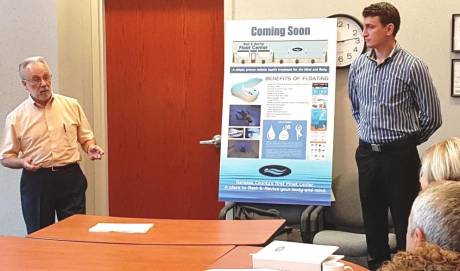The Batavia Development Corporation has decided to “float” a loan to a longtime Batavia businessman who believes he has tapped into the next big thing in healthy relaxation methods.
At its meeting this morning at the City Centre, BDC board members voted unanimously to extend a $30,000 loan to Gary VanValkenburg and his partner, Brandon Buckle, (left to right in photo above), toward the opening of Rest & Revive Float Center at 596 E. Main St.
The site of the new business, which VanValkenburg said he expects to open around Dec. 1, was most recently known as The Bed Room.
In fact, VanValkenburg has been in the bedding business – waterbeds and conventional mattresses – for close to 45 years, following an 11-year stint selling television sets.
He told the BDC board that the bedding business is difficult these days – “everybody is selling mattresses,” he said – and that he realized it was time to find his “niche.”
After being introduced to the “float tank” concept by a visiting professional violinist about three years ago, VanValkenburg said he did some research and is confident in the product’s strength.
“I found a niche. It is on the up curve,” he said. “Over the last three years, (sales) are up by 25 percent. More and more float centers are popping up all over the place.”
VanValkenburg said his center will feature three float tanks – a 4-foot by 8-foot tank, another in a float room and a float pod. He said they are filled with about 10 to 12 inches of water and 800 pounds of Epsom salt.
“You can’t sink,” he said. “It’s more dense than the Dead Sea.”
He explained that users take a shower (a shower is next to each tank) before entering the tank for (usually) 90 minutes and afterward. The tank can be used with the lid open or closed, in a dark room or lit room and with or without music.
“I have arthritis and I tried it, and there was no pain (afterward),” he said. “And it lasted for four, five, six days. It is therapeutic and because there is no gravity, it’s like you’re up on a cloud. It totally relaxes you.”
VanValkenburg said the therapy can help alleviate arthritis, scoliosis, fibromyalgia, migraine headaches and other conditions, and could even benefit those with autism.
Buckle said the tanks are sanitary.
“The amount of salt in the tanks makes it a hostile environment for pathogens,” he said. “As far as bacteria, you don’t have to worry about that.”
He said that the tanks are cleaned for 30 minutes after each use, and are on a regular schedule for deep cleaning and maintenance. Each unit has its own ozone generator, he added.
Buckle said there will be a retail component to the business as well in the form of float beds and other health-related products.
The business partners also have secured a $225,000 loan from Tompkins Bank of Castile and a $100,000 loan from Genesee County Economic Development Center to cover the total cost of the project, VanValkenburg said. The BDC loan is for five years with a 4-percent interest rate.
VanValkenburg said the center will be open seven days a week, from 9 a.m. to 9 p.m. He said the fee to use a tank is $65 but discounts will be available for Rest & Revive members.
In other developments, the BDC board:
-- Reluctantly accepted the resignation of Treasurer Mary Valle, who will be stepping down immediately due to a “conflict of interest.”
Valle said that she, as owner of Valle Jewelers on Jackson Street, and her children, who own the building at the west corner of Ellicott Street and Liberty Streets, plan to apply for some of the available Downtown Revitalization Initiative funds to expand their business ventures.
-- Voted to change the corporation’s designation from 501(c)(4) to 501(c)(3) to make it easier to accept charitable contributions, especially land donations.
-- Authorized President Pier Cipollone and Director Rachael Tabelski as authorized signers to expedite proceedings relating to the Ellicott Station project.
Tabelski said the BDC is communicating with Savarino Companies of Buffalo on a regular basis, but would not say when ground would be broken on the development.
“Every day we gain momentum as each piece is finalized,” she said.
-- Voted to reformat and expand the Building Improvement Handbook for the DRI Building Improvement Fund at a cost of no more than $3,300. Tabelski said the cost is reimbursable through the DRI.
-- Expects the City of Batavia’s commitment of $15,000 to fund Phase II environmental work at the Creek Park site (behind Falleti Ice Arena) to be transferred soon.
The goal, Cipollone said, is to consolidate three existing parcels – one owned by the City, one owned by Genesee County, and one owned by the Town of Batavia – into one property that can be offered to potential developers.












